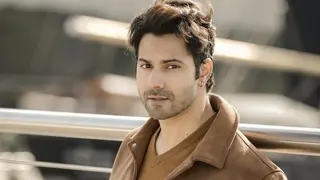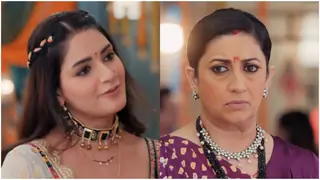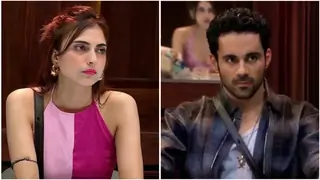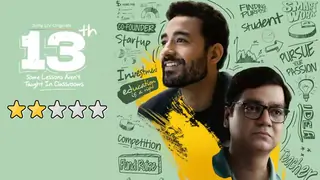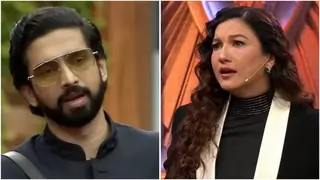The episode began with Dadu and Beeji busy embroidering a chunni for Babita, and discussing with Naeem Bi how they wished her well and prayed for a happy future for her. She had indeed been a daughter to them, and this was their way of showing their appreciation and affection for her.
It was important to show the mindset of the senior citizens, where Naeem Bi pointed out that society still had a long way to go before they were open-minded about divorced women remarrying. Often times, such thinking came from the senior echelon of society, comprised of people whose mindset was similar to what Dadu and Beeji's may have been at one point. I believe this is the reason the senior Khuranas have been kept around, to show that it is important for all areas of society reform, not just the present or future generations. Only then will their thought process evolve for the better.
It would be interesting to see Babita's dynamics with her ex-in-laws after she gets married because they can no longer expect the same things from her, or for that matter Minnie and HS. Lovely's appearance will also be interesting to watch because the senior Khuranas will have changed their perspective in life to a certain extent. I still have reservations about Beeji and am not sure if she has indeed turned over a new life. It's not easy to do so overnight. Time will tell, I guess.
-----
Khatri ka Zeher
It was a pleasant surprise to see Babita sitting on HS' bike, apparently after returning from the temple, in good spirits and talking casually, at ease in each other's company, until Khatri came to ruin the moment.
The previous episode was about poison that was spewed by a loved one, this one was about poison spewed by outsiders. Who better to lead the brigade than our home-grown Khatri? HS knew exactly what was going to happen.
He did not let Babita take the bait, rather challenged Khatri as to so what if she and I love each other and want to be in a relationship?
I have to give credit to HS for the way he put forward his sarcasm and taunts by hitting the young man, and referring to the "right age" for love, indicating that HS and Babita were doing things the "modern" way. This scene was actually quite well set up. Only this PH could have come up with such screenplay where instead of Khatri and HS just barking at each other or lecturing back and forth, Khatri used the young man to communicate his (and society's) regressive thoughts on Hanita's union.
Not sure how Kammo would react upon hearing that her Khatriji felt he still had a chance.
HS observed Babita closely, knowing that this was affecting her, his anger rising by the minute. It took every bit of his self-control not to grab Khatri by the collar and teach him a lesson.
As Khatri went on to taunt Babita, saying he expected her to start looking for a match for Minnie (what? at this age?! Wouldn't that be child marriage?), also taunting her for one thing that society is still harsh with women about: her desires as an individual, her search for a companion.
I will say though, that Khatri has forever changed the way I would feel when hearing one of my favorite songs:
Na umr ki seema ho, na janm ka ho bandhan
Babita did not understand why HS had said nothing to Khatri. What was the point? If he tried to stop Khatri, other people would speak up. Besides, why would they need to justify anything to him or others? It was best to ignore them.
It was interesting that HS told Babita not to worry as Minnie would take charge of preparations for her wedding, as opposed to their wedding. No one was focusing on what he wanted as a to-be groom but perhaps he didn't really mind as long as mother-daughter were happy with how things were arranged. He just didn't want Babita to be bogged down by thinking about what people would say, because it would do no one any good. He didn't want to get into any arguments or ill will from Khatri or anyone during these auspicious moments.
----
Parents Are People Too
I am not sure what to make of this scene. Where there hints of Mickey and Minnie getting together in the future because of the priest's misunderstanding.
Waise iss umar mein kya zaroorat padh gayi aap dono ko shaadi karne ki?
Which made HS very uncomfortable - the one who labeled himself as a banka naujawan was being viewed as a middle-aged man!
Minnie was enraged, but Mickey was there to calm her down. I felt as if they were a junior HS and Babita.
People look to priests for guidance and assistance in making key decisions in their lives. If they themselves, being so learned in spiritual matters, are so narrow-minded, then what are they teaching society? I guess the CVs wanted to show us a 360 of log kya kahenge in this episode and we got that alright.
Babita went upstairs, upset at what she had heard. HS assured Minnie that he would talk to Babita but not before signalling her to take a deep breath and calm her anger down. They all needed to remain calm as this was far from over.
As HS entered the room to find Babita crying, he began to show his mock anger at the priest, even offering to beat the priest up and straighten him out.
Why was the priest focusing on them being parents and not individuals who were going to marry each other?
But this is how society looks at things, right? What was the point in blaming the priest or Khatri?
Babita showed that she, too, had thought that way once. I think part of Babita's anxiety also came from being unable to reconcile her own thought process, which had hitherto matched that of other people in society, with the fact that she had been presented with different situations in life, which meant that her previous notions no longer applied in her case. Where did her convictions and ideologies fit in the grand scheme of things. Deep down, she knew she was doing nothing wrong by marrying the man she wanted to spend the rest of her life with. He was honorable and respectable and worth considering as a life partner. They were marrying with all the rituals, so nothing was wrong with their approach to it. Yet, somewhere at the back of her mind, there lingered the mindset that she herself had been brought up with regarding divorce, remarriage, and the responsibility of parents meaning they needed to focus only on their kids and forget about their own wishes and desires.
It was Minnie's age to get married, she said, because Babita herself had been married at that age. What? She still needed to learn that what happened in the past did not necessarily make it right or apply to Minnie or her generation, for that matter not to Babita and HS' generation either. Babita even admitted that had her own parents done something of this sort, she would not have been able to accept it, but she was also battling with her own desire to move ahead in life with HS. Hence the reason for her dilemma.
HS did not like seeing her upset, so to lighten the mood, he suggested they forget about all the wedding and all the noise around it, and opt for a live-in relationship, i.e. continue living under the same roof as they had been so far. I still think he meant his version not Minnie's version of this concept. Babita's look stopped him in his tracks but he made light of it.
Then came HS' diatribe, which I understand was important because the CVs were trying to give a message to society, but for the first time I felt PB was being preachy.
Yeh na log wala hi matter aa jaata hai beech mein, ke log kya sochenge, ke bolenge.
Maine aap ko pehle hi bataya tha na ke sabsa bada rog, ke kahenge log. Yo hi to hai.
Then to lighten her mood, he sang
Kuch to log kahenge, logon ka kaam hai kehna.
Chhodo ye bekar baaton mein, kahin beet na jaaye rehna.
I think it was a brilliant move by the CVs to include this song and in this specific scene. Aniruddh's voice was a surprise, and I think he sang relatively well considering the circumstances. I was very pleased to hear this for two reasons.
Firstly, it is one of my favorite songs, from one of my favorite movies, Amar Prem, shades of which I have seen on this show and have also mentioned in some of my posts. Kishore da ga ga kar thak gaye, par logon ne iss gaane ke bol par abhi tak amal nahin kiya. The movie was from several decades ago, but even now as back then, people still worry about what others would say at the expense of their own happiness, even if they know that they what they want or do is not illegal or unethical. We haven't evolved as a society if people still think that way.
Secondly, the Haryanvi accent made it all the more amusing but it also showed that if a simple person like HS who was not the stereotypical 'urbanized, modern' hero could have such an open mind, then why not others in society?
And of course the Pushpa, I hate tears, with the signature Rajesh Khanna move made Babita smile (here I felt it was more Aniruddh than HS). I think one of the reasons these two could be compatible is HS' sense of humor, which balances Babita's more serious nature. It would also help her learn to lighten up over time as she lets go of her inhibitions.
HS continued to urge her to be happy and not worry about these things. He reassured her that everything would turn out well, that the three of them would work it out.
Aap hain, Minnie hai, main hoon. Teenon milke jeevan kaat lenge badiya sa.
This is another important thing that Babita missed out on all those years. There was no one to be there just to give her moral support and reassure her that everything would be fine. Sometimes a few words of encouragement can go a long way towards building/restoring a person's confidence.
Then HS went into one of his monologues on how society needed to change, not just in Patiala but in all of India. That is was high time people felt free to live their lives and remarry if they wanted to. They had the right to make decisions for their own happiness.
My life, my choice, my wish.
If people caused trouble, the police was there to sort matters out.
Here HS switched tracks again and said ever so flirtatiously,
Waise ek baat hai.
Ab aap jo ho woh thanedaar ki biwi banne waale ho na?
Aadhi FIR to aap bhi kara sakte ho. Hein? Nahin sach mein!
Aap bol doge na FIR ho jayegi.
There was so much meaning behind these statements. He wanted Babita to understand that her status was about to change. She was going to be his wife, and with that she was going to inevitably get some form of social recognition too as the spouse of a policeman. She needed to rejoice in this newfound power and authority, and that as his wife she had the right to the prestige that his position came with. He wanted to address her insecurities that she was doing nothing wrong, she was marrying him to become his partner in every sense of the word, without having to lose her identity.
I also found it interesting that he said biwi and not lugaai. I have been trying to put my finger on it but I think it might have something to do with him treating her as a woman of a higher class of society than himself and that the word biwi might be more appropriate with her as it involved some sort of prestige and formality, whereas lugaai was more commonplace, more for someone who he shared a more informal connection with.
He had addressed Imarti as his lugaai, so this might be another subliminal way of showing the difference between them. Or it could just be a Punjabi versus Haryanvi thing. Not sure if this is making any sense.
The scene ended with him observing her expressions closely and he was concerned that this matter was not going to go away so easily, that there were still some insecurities of hers that they would together have to address during the course of the wedding. She was not such a simple person to deal with.
The log kya kahenge spiel continued with the ladies from the parlor asking nosy questions that offended Babita and made her refuse to continue with the beauty care regimen.
As many of you have mentioned, I felt as if something was off, that neither HS nor Babita seemed wholly into the whole wedding. I expect these to be resolved before the big day, hopefully.
-----
Pre-cap
Minnie walked in on her parents sharing pizza, her realizing that they needed some space.
PS, I didn't particularly like this episode but decided to write about it anyway for the sake of continuity.






















